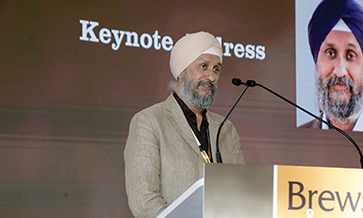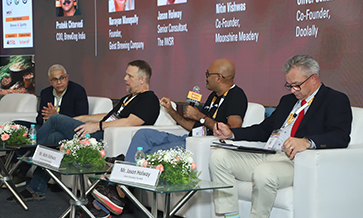The Covid-19 pandemic caught the food and beverage industry by surprise and sent it into an unprecedented free fall. Roy Thomas looks at the existential crisis confronting bars and restaurants, their acute financial vulnerability, and ways in which recovery can be possible. He also spoke with a few leading industry figures across the country to understand how they are coping…
The year 2020 will be remembered for many things. Not so long ago the Rs. 4.25-lakh-crore hospitality industry, which employed an estimated 7.3 million people, was on a roll – the sky was the limit and the world was its oyster.
Without any warning, the Covid-19 curveball struck and, like a tsunami, left in its wake disruption of unprecedented proportions that affected all aspects of social life and every business.
Cut to the last quarter of this forgettable year. Even though the world has not been able to extricate itself from the stranglehold of the pandemic, bankers already talk about emerging green shoots, and industry mavens will have us believe that the economy is on the rebound.
Is that really the truth and is resurgence round the corner? Each industry takes a different trajectory with problems specific to each vertical, and the road to recovery is going to be bumpy as the factors that come into play are many and diverse. Another reality: this will continue until a vaccine is found and normalcy restored.
The pandemic has upended the services sector in general and the restaurant/ bars/ pubs that form part of the hospitality industry in particular. As per reports, it is estimated that up to 40% of the restaurants have already shut shop, with such incidence being higher in bigger cities due to high cost of operations.
The ones who will be left standing will be the ones who can formulate a successful holding strategy and develop the ability to think on one’s feet. The industry will have to reimagine and reinvent itself in many ways just to stay in business. The ability to adapt and evolve holds the key to survival.
Surveys are projecting that gradually around 75% of the customers will start patronising their favourite restaurants and pubs. This throws the key question: When will that happen? Can everyone hold out till this indeterminate date in the future?
Govt. support
The silver lining on an otherwise dark horizon is that governments, both at the Centre and in states, have begun to realise that the proverbial ‘golden goose’ has been dealt a body blow and the ‘cash cow’ that stood them in good stead through the years will need hand-holding now.
States are beginning to realise the multiplier effect the F&B industry has to fuel revenues to the exchequer, and have begun to fast-track sweeping measures and reforms to revive the alcobev sector. Key states like Maharashtra, Karnataka, Delhi and West Bengal have allowed the reopening of bars and restaurants in this phase of “unlock”.
The Delhi government recently announced a slew of decisions to do away with procedures that were coming in the way of ease of doing business in the national capital. It has done away with multiple-license-raj (tourism, police and health departments). It is permitting services in open places, balconies and verandas, and also allowing restaurants to operate round-the-clock.
Meanwhile, the Maharashtra government announced a reduction in excise license fees by almost 90% and the waiver of the fee for a period of 6 months, the duration for which establishments were required to be shut. The deadline for deferment of payments towards the first installment of the excise license fee has also been extended.
Several states have also started reversing the steep hikes in taxes and additional cess. Delhi, Odisha, West Bengal and the Union territory of Jammu and Kashmir have withdrawn the additional 30% VAT on beer.
However, the online delivery model – promoted by states like West Bengal, Jharkhand and Chhattisgarh – remains a non-starter, due to steep delivery charges by aggregators such as Swiggy and Zomato. Alcobev companies suggest that the solution lies in permitting retail outlets to set up online portals to sell alcohol.
Staying safe
Physical distancing and wearing of masks are very much part of the new normal. However, man is a social animal and the inherent need to fraternise and indulge in social drinking and dining is ingrained in his DNA.
The current situation dictates that managing physical distancing is critical. Strict new hygiene measures have also been mandated, which could present a variety of challenges for venues. For many brands (bars and restaurants) these call for rewiring and rebooting the business.
All players will have to go by the guidelines of the World Health Organisation and the Food Safety and Standards Authority of India and also implement standard operating procedures (SOPs) mandated by their state governments and local administrative bodies.
Meanwhile, others are even going the extra mile by introducing their own safety and sanitisation programmes by tying up with external inspection and certification services providers that cover the entire gamut of F&B operations.
Hidden technology
Most big names have launched full-service hospitality apps and web-based solutions, to support their customers and the wider industry in navigating the ‘new normal’. They provide operators with the technical capabilities required to offer seating, ordering and payment, as well as collection and delivery services.
And while touch-less technology is a must, certain collection and queuing apps have also seen growing interest – these apps allow customers to disperse away from a queue or collection point and get on with other things. Call-for-service buttons enable customers to request service from their seats. Even operators can ensure that all calls are attended, and are able to better manage staff and workload.
Enhanced air purification is another area that is being carefully looked at as the virus can linger in poorly ventilated indoor spaces. Making places safer would mean improving air quality.
The goal in ventilation is to replace potentially virus-laden air indoors with virus-free air. Air purifiers and HVAC filters are designed to filter pollutants or contaminants out of the air that passes thru them, thus minimising particles containing viruses.
Covid-19 is said to be highly susceptible to alcohol, soap and ultra-violet (UV) irradiation. When UV light is harnessed for sanitising, the process eliminates up to 99.9% of bacteria and viruses. More and more public places, including airports and hotels, are using UV light sanitisation in their HVAC systems to kill airborne bacteria and viruses.
Key takeaways
The Covid-19 pandemic has made people re-think lifestyles and revisit spending habits, especially against the backdrop of reduced job security. As per reports, overall there has been a 40% drop in spending, compared to 2019.
For the F&B industry, a careful review of optimal pricing and costs is definitely a must. If necessary, pubs and restaurants might have to temporarily down-trade, or reduce the number of features of a product, to suit the selling price demanded by their customers.
Layoffs, closures and associated hardships have had an irrevocable effect on the industry; but staff safety, welfare and stress reduction is something that all businesses would be well advised to invest in. Job security will go a long way to ensuring goodwill and will result in outstanding service.
Digital marketing in hospitality is on the rise, and with venues not being able to rely on their physical presence in lockdown, a strong online strategy is even more pertinent. It is now almost essential that bars, restaurants and other food and entertainment venues communicate and connect with customers in the digital world.
Sustainability is also at the forefront of consumer purchasing power and business strategy. Making the most of everything – including what was in the past considered ‘waste’ – might just be the right thing in your drinks recipes. Peeled skins and over-ripe bananas can all be used if used imaginatively!













